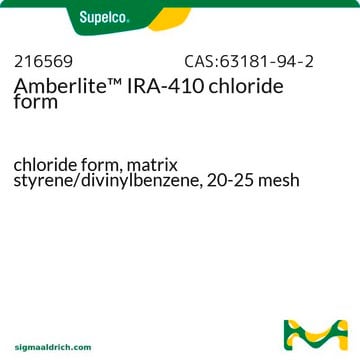31014
Mercury(II) sulfate
ACS reagent, for preparation of solution for COD determination according to DIN 38409, part 41, ≥99%
Synonym(s):
Mercuric sulfate
About This Item
Recommended Products
grade
ACS reagent
for preparation of solution for COD determination according to DIN 38409, part 41
Quality Level
Assay
≥99%
analyte functional class(es)
chemical oxygen demand (COD)
technique(s)
photometry: suitable
ign. residue (after red. with HCOOH)
≤0.02% (as SO4)
anion traces
chloride (Cl-): ≤30 mg/kg
nitrate (NO3-): ≤30 mg/kg
cation traces
Ca: ≤30 mg/kg
Cd: ≤1 mg/kg
Cu: ≤5 mg/kg
Fe: ≤10 mg/kg
Hg+: ≤500 mg/kg
K: ≤20 mg/kg
Mg: ≤30 mg/kg
Na: ≤50 mg/kg
Pb: ≤5 mg/kg
application(s)
environmental
general analytical
SMILES string
[Hg++].[O-]S([O-])(=O)=O
InChI
1S/Hg.H2O4S/c;1-5(2,3)4/h;(H2,1,2,3,4)/q+2;/p-2
InChI key
DOBUSJIVSSJEDA-UHFFFAOYSA-L
Looking for similar products? Visit Product Comparison Guide
Signal Word
Danger
Hazard Statements
Precautionary Statements
Hazard Classifications
Acute Tox. 1 Dermal - Acute Tox. 2 Inhalation - Acute Tox. 2 Oral - Aquatic Acute 1 - Aquatic Chronic 1 - STOT RE 2
Target Organs
Kidney
Storage Class Code
6.1B - Non-combustible acute toxic Cat. 1 and 2 / very toxic hazardous materials
WGK
WGK 3
Flash Point(F)
Not applicable
Flash Point(C)
Not applicable
Personal Protective Equipment
Choose from one of the most recent versions:
Already Own This Product?
Find documentation for the products that you have recently purchased in the Document Library.
Our team of scientists has experience in all areas of research including Life Science, Material Science, Chemical Synthesis, Chromatography, Analytical and many others.
Contact Technical Service








